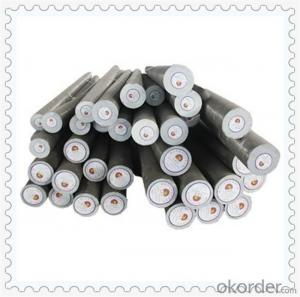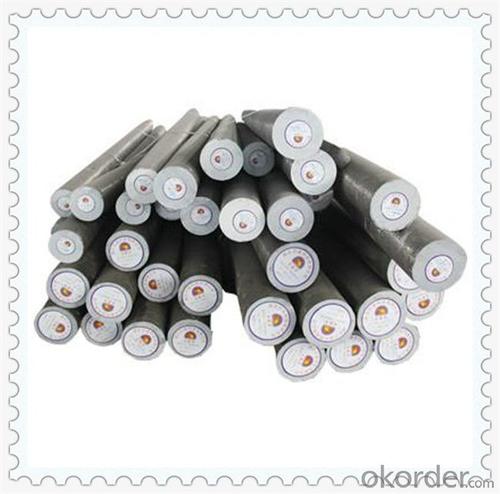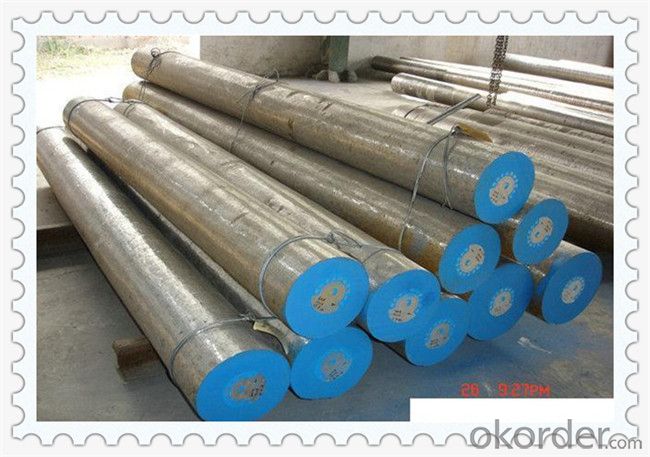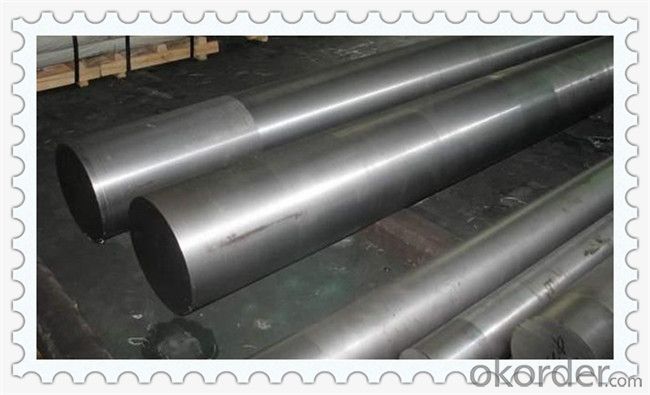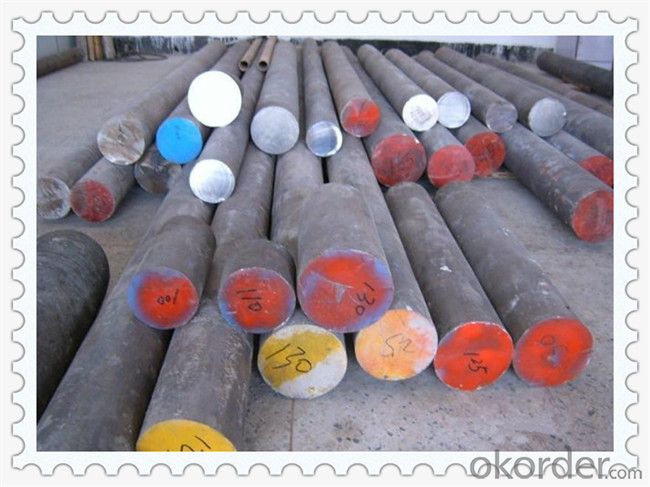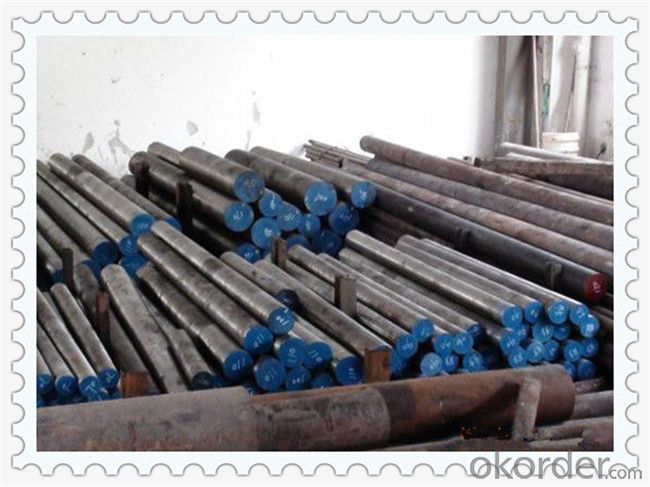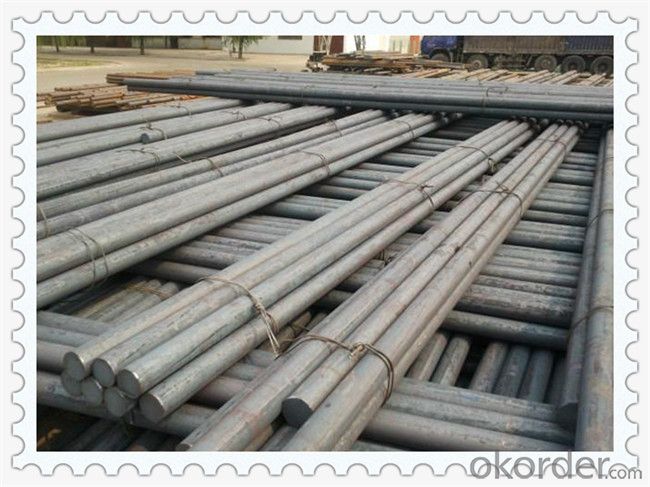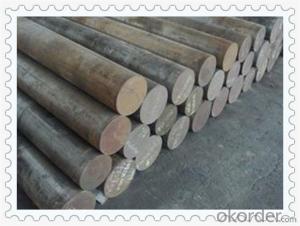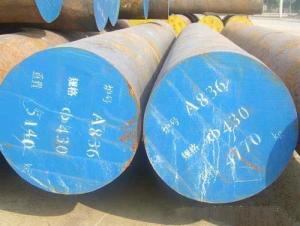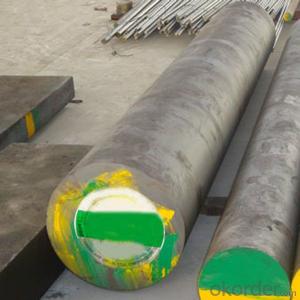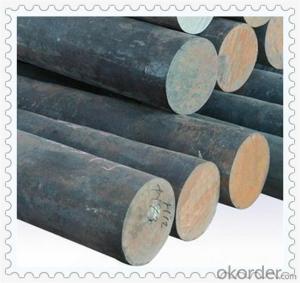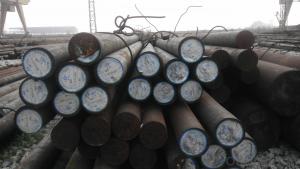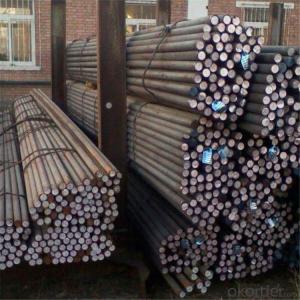Hot Rolled Alloy Structural Steel Round Bar SCM435
- Loading Port:
- China main port
- Payment Terms:
- TT OR LC
- Min Order Qty:
- 30 m.t.
- Supply Capability:
- 10000 m.t./month
OKorder Service Pledge
OKorder Financial Service
You Might Also Like
Hot Rolled Alloy Structural Steel Round Bar SCM435
Products Description
Material: | 30CrMoV, 4135, SCM435, 34CrMo4, 1.7220 |
Diameter: | 10mm-700mm |
Length: | 3000mm-12000mm Straightness: 3mm/M max |
Process: | EAF + LF + VD + Forged + Heat Treatment (optional) |
Delivery condition: | Hot forged +Rough machined (black surface after Q/T)+ Turned (optional) |
Delivery Time: | 30-45 days |
MOQ: | 1 tons |
Heat treatment: | Normalized / Annealed / Quenched / tempered |
Technical Data: | According to the customer's requirement of Chemical Composition, Physical Properties and Mechanical Testing |
Test: | Ultrasonic test according to SEP 1921-84 G3 C/c |
Marking: | Grade, heat NO. length will be stamped one each bar with required color |
Payment: | 30% advance by T\T, the balance against B/L |
Application: | Statically and dynamically stressed components for vehicles, engines and machines. For parts of larger cross-sections, crankshafts, gears. |
Products Show
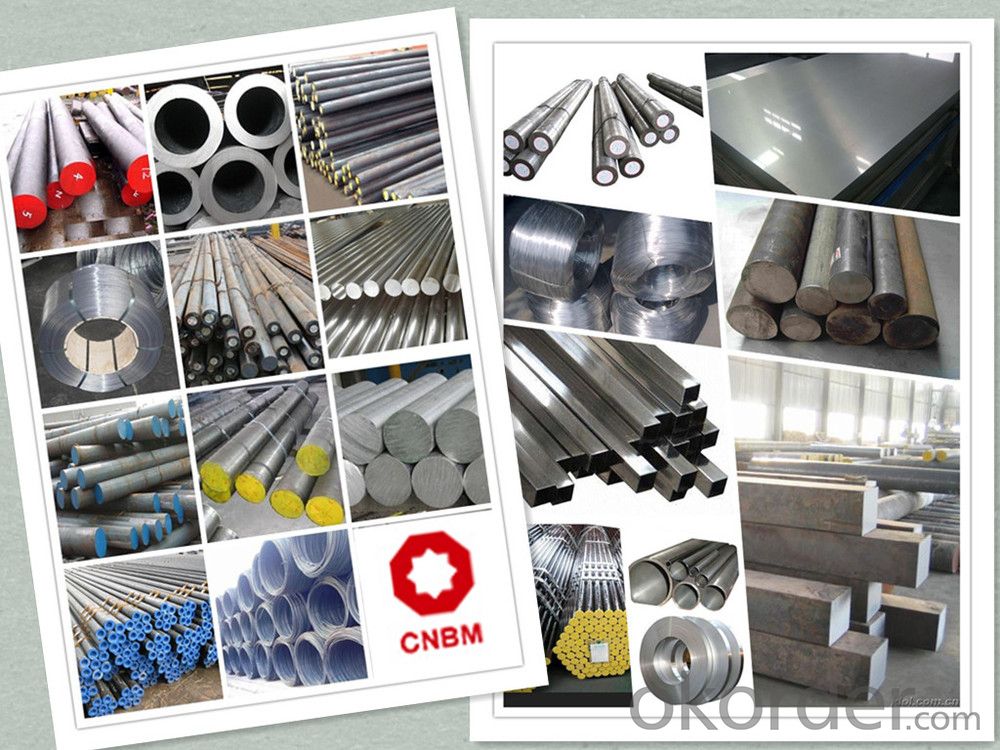
Product Overviews
| Product Name | Typical Grades | Diameter(mm) | Standard adopted |
| Carbon Steel | 20 (1020/S20C/C22) | Ø16-Ø300 |
GB/SAE/JIS/DIN
|
| 40 (1040/S40C/C40) | |||
| 45 (1045/S45C/C45) | |||
| Bearing Steel | GCr9 (51100/SUJ1) | Ø12-Ø250 | |
| GCr15 (52100/SUJ2/100Gr6) | |||
| GCr9SiMn (A485-Gr.1/SUJ3) | |||
Cr-Mo Steel | 20Cr (5120/SCr420H/20Cr4) | Ø12-Ø250 | |
| 40Cr (5140/SCr440/41Cr4) | |||
| 42CrMo(4140/SCM440/42CrMo4) | |||
| Gear Steel | 20CrNiMo | Ø16-Ø600 | |
| 20CrMn(5115/SMnC420/20MnCr5) | |||
| 20CrNiMo(8620/SNCM220/20CrMiMo2) |
Application
| Carbon Steel | Mold bottom, Plastic mold, Construction machinery parts Automobile parts, Security grills, Screens, Construction |
| Bearing Steel | Aerospace, Navigation, Nuclear energy, Chemical industry Electronic information, Petrochemical, Instrument and meter Transportation |
| Cr-Mo Steel | Mechanism & Fasteners gear, Stressed components for vehicles Engines and machines, Parts of larger cross-section |
| Gear Steel | All kinds of gears, Statically and dynamically stressed component for vehicles Engines and machine, Larger cross-section parts, Crankshafts |
Work Shop
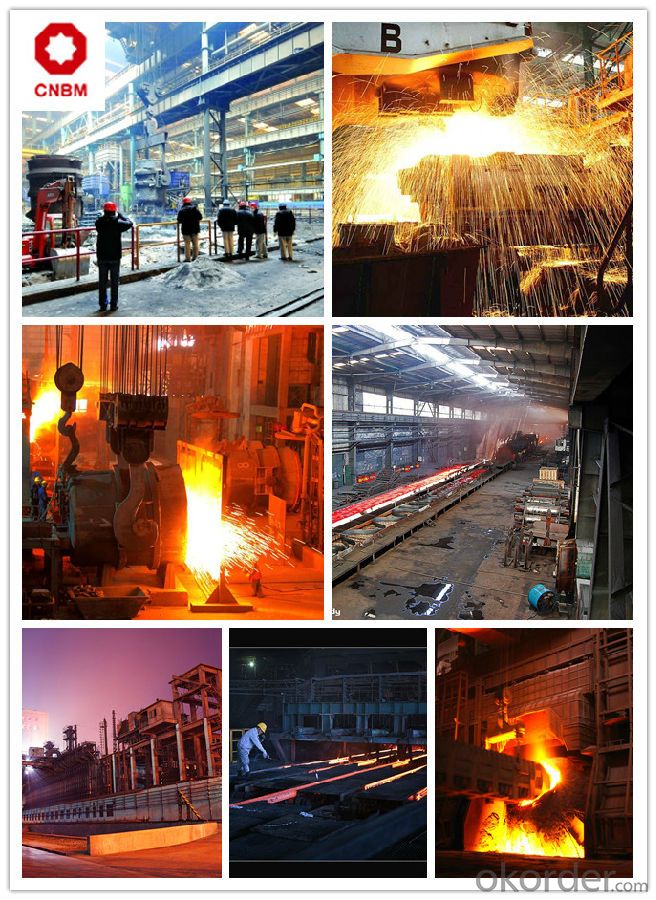
Company Information
CNBM International Corporation is the most important trading platform of CNBM group.
Whith its advantages, CNBM International are mainly concentrate on Cement, Glass, Iron and Steel, Ceramics industries and devotes herself for supplying high qulity series of refractories as well as technical consultancies and logistics solutions.

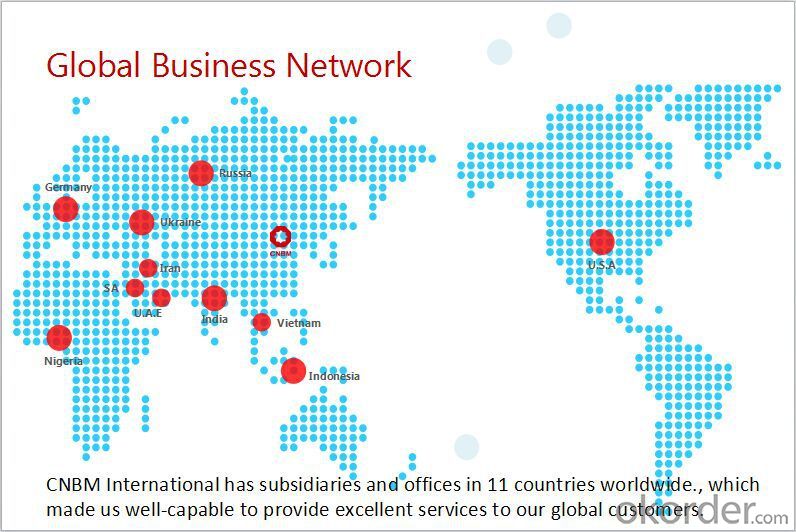
FAQ
1, Your advantages?
professional products inquiry, products knowledge train (for agents), smooth goods delivery, excellent customer solution proposale
2, Test & Certificate?
SGS test is available, customer inspection before shipping is welcome, third party inspection is no problem
3, Factory or Trading Company?
CNBM is a trading company but we have so many protocol factories and CNBM works as a trading department of these factories. Also CNBM is the holding company of many factories.
4, Payment Terms?
30% TT as deposit and 70% before delivery.
Irrevocable L/C at sight.
5, Trading Terms?
EXW, FOB, CIF, FFR, CNF
6, After-sale Service?
CNBM provides the services and support you need for every step of our cooperation. We're the business partner you can trust.
For any problem, please kindly contact us at any your convenient time.
We'll reply you in our first priority within 24 hours.
Packaging & Delivery
1, Packaging: seaworthy package or as required
2, Delivery: 35-45 days or based on quantity
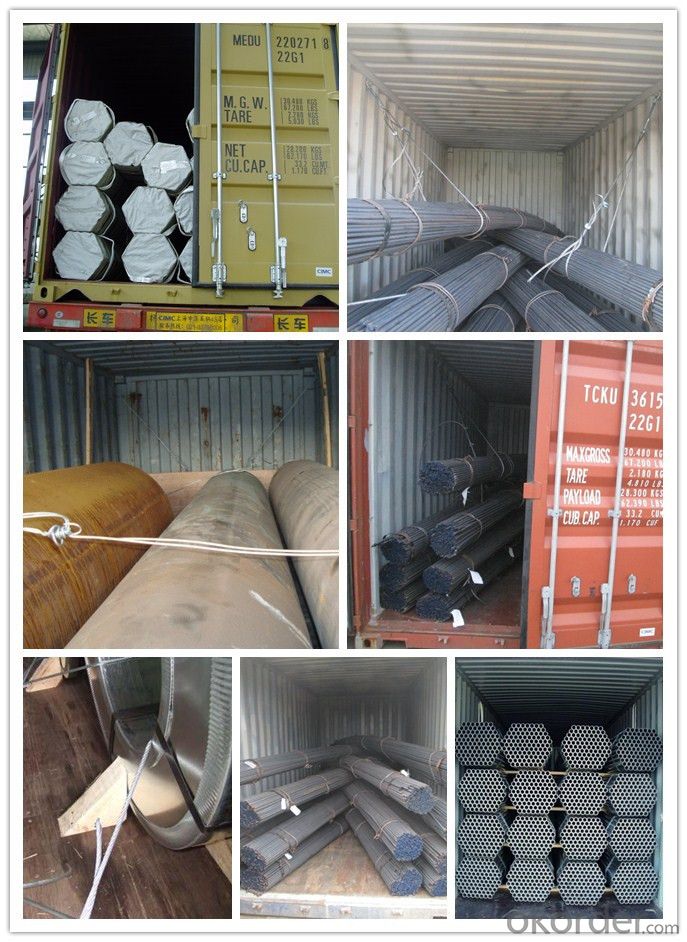
- Q: Can steel round bars be used in the production of construction materials?
- Yes, steel round bars can be used in the production of construction materials. Steel round bars are commonly used in the construction industry due to their high strength and durability. They can be used to reinforce concrete structures, such as beams, columns, and slabs, providing additional strength and stability. Steel round bars can also be used in the fabrication of steel frames, trusses, and other structural components in buildings and bridges. Their versatility and ability to withstand heavy loads make them a popular choice in the construction industry.
- Q: Can steel round bars be used for making agricultural equipment or machinery?
- Yes, steel round bars can be used for making agricultural equipment or machinery. Steel is a commonly used material in the construction of such equipment due to its high strength, durability, and resistance to wear and tear. Steel round bars can be used to manufacture components like axles, shafts, handles, and structural supports, providing the necessary strength and reliability required for agricultural applications.
- Q: What is the thermal conductivity of a steel round bar?
- The thermal conductivity of a steel round bar typically ranges from 15 to 50 W/m*K, depending on the specific grade and composition of the steel.
- Q: What are the advantages of using chromium-alloy steel round bars?
- There are several advantages to using chromium-alloy steel round bars. Firstly, chromium-alloy steel round bars have excellent corrosion resistance properties. The addition of chromium to the steel increases its ability to withstand corrosion and oxidation, making it suitable for use in harsh environments or applications where exposure to moisture or chemicals is a concern. This corrosion resistance helps to prolong the lifespan of the round bars, reducing maintenance and replacement costs. Secondly, chromium-alloy steel round bars offer high strength and durability. The alloying of chromium with steel enhances its mechanical properties, such as tensile strength, hardness, and toughness. This makes chromium-alloy steel round bars ideal for applications that require high strength and resistance to wear and tear, such as construction, heavy machinery, and automotive industries. Another advantage of using chromium-alloy steel round bars is their heat resistance. The addition of chromium improves the heat resistance of the steel, allowing it to maintain its strength and structural integrity even at elevated temperatures. This makes it suitable for use in high-temperature applications, such as furnace components, boilers, and heat exchangers. Furthermore, chromium-alloy steel round bars are known for their excellent machinability. The alloying elements in the steel enhance its ability to be easily machined, allowing for precise shaping and finishing. This makes it easier and more cost-effective to manufacture complex components or parts using chromium-alloy steel round bars. Lastly, chromium-alloy steel round bars are readily available in the market. Due to their popularity and wide range of applications, chromium-alloy steel round bars can be easily sourced from various suppliers. This availability ensures a consistent supply of the material, reducing production downtime and lead times. Overall, the advantages of using chromium-alloy steel round bars include corrosion resistance, high strength and durability, heat resistance, excellent machinability, and availability. These properties make chromium-alloy steel round bars a versatile and reliable choice for a wide range of applications in various industries.
- Q: What is the difference between a rough turned and a seamless steel round bar?
- A rough turned steel round bar refers to a bar that has undergone a preliminary turning process, where excess material is removed to achieve a desired shape or size. On the other hand, a seamless steel round bar is manufactured without any seams or welds, ensuring a smooth and uniform surface throughout the entire length of the bar. Essentially, the difference lies in the manufacturing process and the resulting surface finish.
- Q: Is there a standard for the grounding of pumping units and the length of the length of the angle steel or round steel?
- Yes, the length of the grounding body must not be less than 2.5 meters.
- Q: Can steel round bars be used for making suspension springs?
- Yes, steel round bars can be used for making suspension springs. Steel is a commonly used material for suspension springs due to its high strength and durability. The round bars can be forged or shaped into the desired spring shape and then heat-treated to achieve the desired spring characteristics. Additionally, steel round bars can be easily machined and drilled to accommodate different suspension systems and components. However, it is important to consider the specific requirements and load capacity of the suspension system to ensure that the chosen steel round bars are suitable for the intended application.
- Q: How do steel round bars compare to copper round bars?
- Steel round bars and copper round bars have several key differences. Firstly, steel is a much stronger and more durable material compared to copper. Steel round bars can withstand higher levels of stress and are often used in heavy-duty applications requiring great strength, such as construction and engineering projects. On the other hand, copper round bars are softer and more malleable, making them ideal for electrical and plumbing applications. Additionally, steel round bars have better corrosion resistance than copper round bars. Steel can be coated or treated to prevent rust and corrosion, while copper is prone to oxidation and requires regular maintenance to prevent tarnishing. In terms of cost, steel round bars are generally less expensive than copper round bars. The availability and abundance of steel contribute to its lower price, while copper is a more scarce and costly material. Ultimately, the choice between steel and copper round bars depends on the specific application and requirements.
- Q: How do steel round bars compare to fiberglass or composite bars?
- Steel round bars and fiberglass or composite bars exhibit distinct differences in their properties and applications. Strength and Durability: Steel round bars possess exceptional strength and durability, boasting a high tensile strength that enables them to withstand heavy loads and stress. Conversely, fiberglass or composite bars possess a favorable strength-to-weight ratio but generally lack the same level of strength as steel bars. They may be more susceptible to bending or breaking under high pressure or impact. Weight: A significant disparity exists in weight between steel bars and fiberglass or composite bars. This contrast can prove advantageous in certain applications where additional weight is necessary for stability or to counteract external forces. Conversely, situations that prioritize weight reduction, such as in the aerospace or automotive industries, favor fiberglass or composite bars due to their lightweight nature. Corrosion Resistance: Steel bars are prone to corrosion, particularly when exposed to moisture or harsh environments. Consequently, they necessitate regular maintenance and protective coatings to prevent rusting. In contrast, fiberglass or composite bars inherently possess corrosion-resistant properties, rendering them suitable for applications prevalent in marine or chemical industries that often involve exposure to corrosive elements. Electrical Conductivity: Steel round bars boast electrical conductivity, which proves advantageous in specific applications requiring electrical grounding or conductivity. Fiberglass or composite bars, by contrast, are non-conductive and preferred in situations necessitating electrical insulation, such as in electrical installations or sensitive electronic systems. Cost: Steel bars generally offer a more cost-effective solution compared to fiberglass or composite bars. The abundance of raw materials for steel production contributes to their affordability in most cases. Conversely, fiberglass or composite bars involve intricate manufacturing processes and the utilization of specialized materials, leading to higher production costs. In conclusion, steel round bars are favored for their strength, durability, and cost-effectiveness, finding widespread use in construction, manufacturing, and infrastructure projects. Conversely, fiberglass or composite bars present advantages in weight reduction, corrosion resistance, and electrical insulation, frequently finding application in industries that prioritize these properties. The selection between the two hinges upon the specific requirements and conditions of the project or industry.
- Q: Are steel round bars resistant to impact?
- Yes, steel round bars are generally resistant to impact. Steel is known for its high strength and durability, making it highly resistant to impacts and forces. The round shape of the bars also helps distribute the impact evenly, reducing the risk of deformation or breakage. However, it is important to note that the specific resistance to impact may vary depending on the grade and quality of the steel, as well as the magnitude and nature of the impact force.
Send your message to us
Hot Rolled Alloy Structural Steel Round Bar SCM435
- Loading Port:
- China main port
- Payment Terms:
- TT OR LC
- Min Order Qty:
- 30 m.t.
- Supply Capability:
- 10000 m.t./month
OKorder Service Pledge
OKorder Financial Service
Similar products
Hot products
Hot Searches
Related keywords
